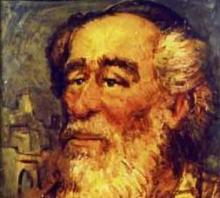The term "dark ages" is rather Europe-centric. While many of those territories formerly under the control of the Roman Empire saw several hundred years of lost knowledge, troubled governments and failing health, other parts of the world thrived. The Muslim world was particularly active in that period. From Persian, Arab and Moorish territories such innovations as algebra, advanced architecture and modern poetic forms arose. In the Muslim world's Jewish threads, some of the greatest thinkers traveled and wrote extensively during this time. Among them, few were as important as Abraham ibn Ezra.
Rav Abraham ben Meir ibn Ezra was born in Tudela, Spain, probably in 1089 CE. His cousin, Moses ibn Ezra grew to be a famous philosopher and poet in his own right, but Abraham is the more prolific and impressive of the two. Rav ibn Ezra was supposedly very good friends with another great Jewish theologian, Yehuda Halevi. There is also strong evidence that ibn Ezra married Halevi's daughter.
ibn Ezra was, like many of the great Jewish thinkers of his time, a globe-trotting writer. By the middle of his life he had very little family. Three of his four sons had died, while the fourth converted to Islam. At that time, doing so would have meant a complete separation of the communities in which father and son lived. At that point, ibn Ezra began his travels and essentially didn't stop until his death at an unknown date and in one of several potential places. In his wanderings, ibn Ezra carried knowledge which he took it upon himself to distribute through Jewish communities all over the world.
Though an incidental philosopher and an accomplished poet, Abraham ibn Ezra was more interested in concrete systems. His two greatest contributions were in linguistics and (indirectly) in mathematics. In the latter case, he brought the advanced mathematical principles of his Muslim homeland to Jews in Christian-controlled Europe. Such concepts as the decimal system and the use of zero found their way into Jewish communities thanks to ibn Ezra, who used Hebrew letters to represent numbers in a unique system, much of which remains in modern Israel.
As a linguist, ibn Ezra is largely responsible for solidifying the understanding of Hebrew grammar. He wrote several key texts concerning the Hebrew language and how it is used both in the Torah and in other sources. He also translated several important Arabic books into Hebrew, making them accessible to a much larger portion of the Jewish population of Europe and Asia.
Rav ibn Ezra also penned a well-regarded series of biblical commentaries. His works concerning the Torah are as respected as those of great Talmudic scholars like Rashi. ibn Ezra's approach was often to find the most straightforward meaning in the stories of the Torah rather than to dig for the more complex, reference-heavy ideas preferred by most theologians. He never really constructed midrashim to explain his views on the Torah. Instead he deconstructed word usage.
This interest in language almost got ibn Ezra into trouble. Some of his views bordered on high controversy, such as his insinuations that the Torah was written by multiple authors over a long period of time, rather than transcribed by Moses all at once. In his writings he used a particular phrase, "The intelligent will understand" whenever he approached an idea that went against the grain, so he never ruffled anyone's feathers hard enough to endanger himself.
It is suspected that Abraham ibn Ezra died in 1167, though where exactly he passed is a matter of debate. Some sources have him in London, others in Jerusalem or in Rome. Regardless, he left behind a vast library of important works and a legacy of language-driven exegesis that scholars follow to this day.
